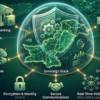
Navigating Remote Work for International Companies: 2024
The landscape of work has undergone a transformative shift with the rise of remote work, opening up opportunities for professionals to collaborate with international companies from the comfort of their homes. Working remotely for international companies presents a unique set of advantages and challenges, requiring adaptability and effective communication to thrive in this globalized work environment.
Global Collaboration: One of the most significant perks of working remotely for international companies is the opportunity to collaborate with diverse teams from around the world. This global collaboration brings together a wealth of perspectives, ideas, and experiences, fostering creativity and innovation within the virtual workspace.
Flexible Work Hours: Remote work for international companies often comes with the flexibility to set your own work hours. This allows individuals to align their schedules with different time zones, promoting a healthier work-life balance and accommodating personal preferences.
Cultural Exposure: Engaging with colleagues from various cultural backgrounds provides a rich learning experience. Understanding and respecting cultural nuances become essential in a remote international setting, contributing to improved communication and a harmonious work environment.
Technological Integration: Remote work necessitates seamless technological integration. International companies invest in cutting-edge communication and collaboration tools, enabling remote workers to stay connected, share information, and collaborate efficiently despite physical distances.
Increased Job Opportunities: Working remotely opens up job opportunities beyond geographical constraints. Professionals can explore positions with international companies that align with their skills and expertise, broadening their career horizons and enhancing their professional growth.
Communication Challenges: While technology facilitates communication, remote work for international companies may pose challenges related to time zone differences and language barriers. Clear and concise communication, along with the use of collaboration tools, becomes crucial in overcoming these challenges.
Cross-Cultural Team Dynamics: Managing teams spread across different countries requires a deep understanding of cross-cultural team dynamics. Remote workers must navigate through diverse communication styles, decision-making processes, and work approaches to build strong and cohesive virtual teams.
Independent Work Ethic: Remote work demands a certain level of independence and self-discipline. Professionals working with international companies remotely must be self-motivated and capable of managing their tasks efficiently without constant supervision.
Security and Compliance: Remote work often involves handling sensitive information. Professionals must adhere to security protocols and compliance standards to ensure the confidentiality and integrity of data, especially when working for international companies with varying regulatory requirements.
Professional Development Opportunities: Remote work for international companies may provide unique professional development opportunities, including exposure to different markets, industry practices, and global networking events. Proactive engagement in such opportunities can enhance one’s skill set and contribute to long-term career growth.
Working remotely for international companies is a dynamic and rewarding experience that comes with its share of opportunities and challenges. Embracing this global shift requires a blend of adaptability, effective communication, and a commitment to continuous learning. As professionals navigate the virtual landscape, the ability to thrive in a remote international setting becomes a valuable skill that opens doors to a world of possibilities.







